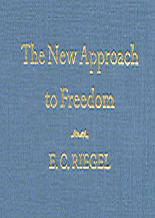 Home Page
Home Page Open PDF Version
Open PDF Version Purchase Hardcopy
Purchase Hardcopy
 THE NEW APPROACH TO FREEDOM
THE NEW APPROACH TO FREEDOMTogether with Essays on the Seperation of Money and State by E. C. Riegel Edited by Spencer Heath MacCallum THE HEATHER FOUNDATION
Copyright © 2003 The Heather Foundation |
||
|
||
|
COMPLETE FREEDOM OF CHIOCE is brought about in exchange by what is known as competition, which is the process whereby selectivity operates and economic affinity is assured. This great and indispensable principle of life is often stigmatized as an evil, and is the victim if not the conscious object of all attacks by planned economy against the natural order. If we cannot hold the principle of free competition inviolate, there is no need to pursue the subject of free money, for money is but the handmaid of competition. Money facilitates competition, and if competition is to be restrained, pursuit of a true monetary system is a contrary aim. Competition is inherent in exchange. Impediment to one is impediment to the other. Competition is the guarantor of our basic liberty, since without freedom to trade where one's need and preference are best served, all other liberties become atrophied. Competition is the scale that weighs the worth of the service of each man to his fellow man. If there is nothing to impede it, the greatest equity is attained, because each trader has received the acme of satisfaction. This does not imply that all are assured equal rewards, but rather that all receive their just deserts. Nor does it exclude the action of good or ill fortune. One may, by good fortune, discover a natural value or improved method or possess a special talent that is of limited supply and hence priceable at a higher level. One may, through ill fortune or bad judgment or false effort, lose trading power and even suffer total loss. Competition inspires enterprise, rewards the good servant and punishes the poor one. It is the universal police system through which we all police one another's economic behavior. Through its operation, society ostracizes the bad and honors the good. It never errs; it is never unjust. It is infallible. Though we are dealing here only with man's business conduct, it is well to comprehend that so universal is competition that it is the natural governor of all human behavior. There must not be read into this tribute to the rule of competition an assertion that competitors do not suffer handicaps that make the competitive system seem harsh. It does imply, however, that such harshness is the result of distortion in the economic system—mainly through the monetary branch—whereby some traders have escaped the salutary influence of competition and thus gained unnatural trading power, adverse to their competitors. The remedy for evil effects in competition is more competition, since it is but the lack of it that produces bias. Nor must any implication be drawn that competition does not permit society to starve and kill that which is unwanted. How else could it permit progress; how else could it provide the means of punishment for the slothful, the vicious, and the unsocial? How else could it be democratic? The obsolete, the unfit, the unwanted must be eliminated. In life there is death; in death there is life. This is the law of progress. Competition is merely its channel. Lastly, let it be clear that competition does not lessen the opportunity of any man to grow relatively rich, if such rewards come for services rendered and voluntarily paid. It merely permits society to defeat the extortioner. Nor does it save any man from being relatively poor. It merely secures him against poverty if he can and will render service to his fellow man. |
||